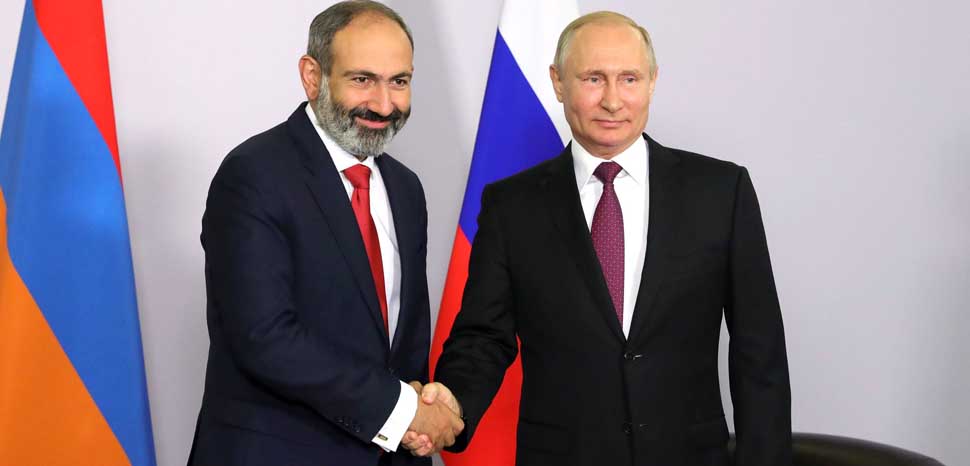Whenever a country is sanctioned, there is always the question of the effectiveness of the sanctions. In the present case of Russia, one loophole of some significance is the EurAsian Economic Union (EAEU), of which Russia is a member. Being a member means that there are no barriers to Russia’s imports from other EAEU members. The other members of EAEU are Armenia, Belarus, Kazakhstan, and Kyrgyzstan.
Among those countries, Armenia is the only one that has an important trade agreement with any Western institution. In particular, its Comprehensive and Enhanced Partnership Agreement (CEPA) with European Union entered into force just over a year ago. Because the CEPA diminishes trade barriers for services as well as commercial goods, as well as simplifying the process of obtaining licenses, Armenia is the best placed member of the EAEU countries to help Russia break sanctions.
Mainly as a result of CEPA, Armenia’s foreign trade with the EU countries grew by almost a quarter in 2021 over 2020 to $1.6 billion, representing just under one-fifth of Armenia’s total 2021 trade turnover. As such, this creates favorable conditions for Armenia to become a bridge to Europe for the countries such as Iran and Russia that are under international sanctions. Armenia’s long-term and heavy economic, as well as military, dependence on Russia gives first-glance credibility that it would do this for Russia.
What other, more direct evidence is there, that Armenia might play such a role? First, there is history. A decade ago, Iran was already exploring the possibilities of using Armenian banks to circumvent sanctions against itself. Bilateral cooperation at the time was close enough for Yerevan to send Tehran arms later used to kill American troops in Iraq.
Bilateral relations have only grown more intimate since then. Yerevan has for several years advocated that the EAEU cooperate more closely with Iran. Indeed, government officials and the expert community in Armenia—the only EAEU member that borders on Iran—have repeatedly offered Armenia as a “bridge” between EAEU and Iran.
There is a legal and practical precedent that illustrates the means for realizing such a “bridge” role. In 2018 Iran signed an interim Free Trade Agreement with the EAEU, as a result of which Armenia and Iran have deepened economic relations. According to this preferential trade agreement, Iran and the EAEU agreed to conditions of a plan for duty-free trade in essential goods.
Just a few weeks ago on March 3, 2022, a high-level Iranian delegation visited Armenia, specifically for the purpose of deepening further the trade relations with Armenia by using it to facilitate access to the EAEU. The delegation notably included Iran’s Minister of Industries, Mining, and Trade, Reza Fatemi Amin. In Armenia, he met with the country’s Deputy Prime Minister Mher Grigoryan, Minister of Economy Vahan Kerobyan, and Minister of Territorial Administration and Infrastructure Gnel Sanosyan, among others.
The two sides agreed to launch new projects for the joint production of pharmaceutical products and household appliances. According to the agreement such jointly produced goods, manufactured in Armenia, will be exported to third countries. Russia, of course, is one such a third country and, like Armenia, an EAEU member. The goods would therefore not be subject to customs or border checks. Such projects as these new Armenian-Iranian joint enterprises represent a precedent—a “demonstration project”—for a system of breaking sanctions on Russia in other economic sectors as well.
The two sides likewise agreed on infrastructure projects in Armenia, such as road-construction by Iranian companies, and also reached preliminary agreements on a number of other issues. Not long before the Tehran delegation’s visit to Yerevan, the Russian media had circulated speculations about possible Iranian membership in EAEU.
What has this to do with Russia? Since sanctions were imposed on Russia, Armenia has become the destination of choice for Russians who are seeking to relocate their businesses, particularly in the information-technology (IT) sector. The Pashinyan government is easing all registration, bureaucratic and residential issues connected with the relocation of Russian businesses to Armenia. They are making every effort actively to lure their owners to Armenia. They have even published a guide for Russian businesses covering everything from physical relocation to crypto-currency transfers to apartment rentals to importing domestic pets.
In the past, due to its favorable geographic location, Armenia has assisted Iran’s money-laundering operations and facilitated its access to international financial system. It is now well-placed to do the same for Russia, and is openly doing so, and is not hiding the fact. Armenia has become not just a “bridge” to Iran but also a “window” for Russia, helping both pariahs to circumvent sanctions. This behavior by Armenia began a decade ago with Iran and is now greatly expanding not only to Iran’s benefit but moreover, and perhaps even more deeply, to Russia’s.
Robert M. Cutler is a Fellow of the Canadian Global Affairs Institute.
The views expressed in this article belong to the authors alone and do not necessarily reflect those of Geopoliticalmonitor.com




